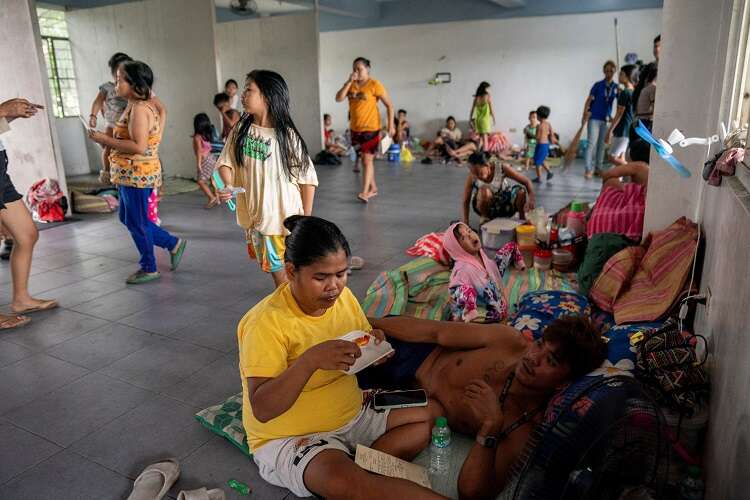
MANILA (Reuters) -Philippine authorities issued an urgent appeal on Saturday for residents in low-lying areas and coastal towns to move to safety as super typhoon Man-Yi gained strength on its approach towards the country’s main Luzon island.
Man-Yi, the sixth tropical cyclone to hit the Philippines in a month, intensified with maximum sustained winds reaching 195 kph (121 mph) and gusts up to 240 kph, according to state weather agency PAGASA.
This prompted it to raise its storm alert to its highest level for the provinces of Catanduanes and Camarines Sur in the central Bicol region.
Ariel Nepomuceno, head of the Office of Civil Defense, urged residents in the typhoon’s projected path to comply with evacuation orders as Man-Yi threatened to unleash heavy rains and powerful winds that could trigger floods and storm surges.
“It is more dangerous now for those in landslide-prone areas because the ground has been saturated by the consecutive typhoons,” Nepomuceno said, warning that storm surges could reach 3 metres (10 ft).
PAGASA warned that the typhoon continues to be a “potentially catastrophic and life-threatening situation” for the Bicol region.
More than 500,000 people in the region’s six provinces have been evacuated, a disaster official told DZRH radio, adding the number is expected to rise as local authorities mobilise more residents.
As of 5 p.m. (0900 GMT), PAGASA reported that the storm was located 120 km east of Catanduanes and was projected to make landfall late Saturday night or Sunday morning.
“It must be emphasized that heavy rainfall, severe winds, and storm surge may still be experienced in localities outside the landfall point,” PAGASA said.
The main capital region Metro Manila is also likely to be affected with heavy to intense rains as early as Sunday.
Locally named as Pepito, Man-Yi also caused the cancellation of dozens of flights in the eastern Visayas region facing the Pacific Ocean.
On average, about 20 tropical storms strike the Philippines each year, bringing heavy rain, strong winds and deadly landslides.
In October, Tropical Storm Trami and Typhoon Kong-rey triggered floods and landslides that killed 162 people, with 22 still missing, government figures show.
This month marked the first time in recorded history that four storms were active simultaneously in the western Pacific Ocean, the Japan Meteorological Agency said.
Nepomuceno said nearly 40,000 uniformed personnel were on standby for search, rescue and relief operations, while more than 2,000 vehicles, including navy vessels, were ready to be deployed.
“We aim for zero casualties,” Nepomuceno said.
(Reporting by Karen Lema; Editing by Clarence Fernandez and Clelia Oziel)


